INSIDE


INSIDE

• An unexpected walk with wildlife
• CATS Trail makes top 10 list in the Adirondacks
• 3P is a cool mix



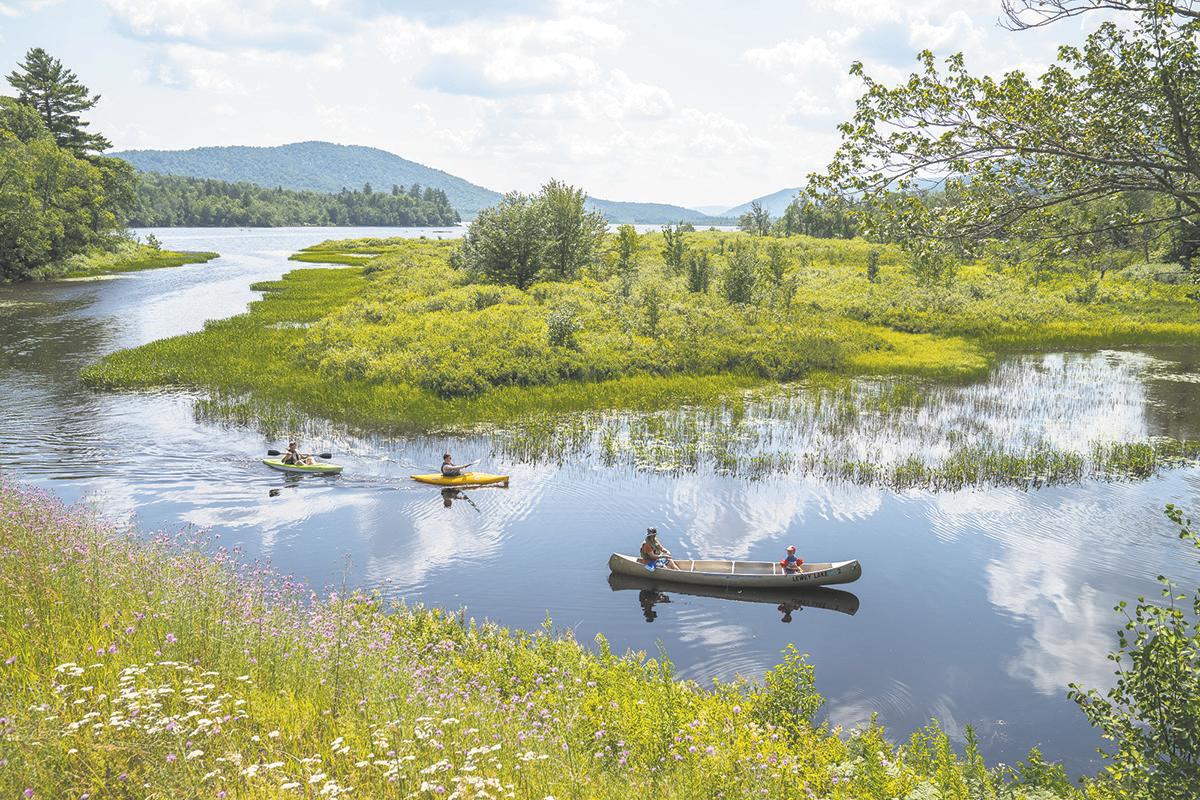























The Guiedeboat was developed around the early 1900’s for outdoor guides to take patrons hunting, fishing and camping in the Adirondack mountains of Upstate New York. The boat was to be fast, stable, seaworthy and capable of carrying lots of weight. It also had to be lightweight in order to portage along the various rivers and lakes throughout the mountains.
This classic guideboat features the stream line hull design from world class marine architect Nick Schade. The hull shape and structure are accomplished by edge-gluing long strips of various cedar strips together in a tongue and groove fashion known as “bead and cove”. The hull is next fiber-glassed over inside and out, then drenched with 3 coats of epoxy, and many coats of varnish. This results in a beautiful, watertight, lightweight, durable, fast, stable and extremely strong watercraft, “A Classic that will last a lifetime, handed down through generations.”
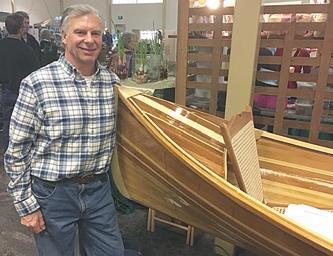

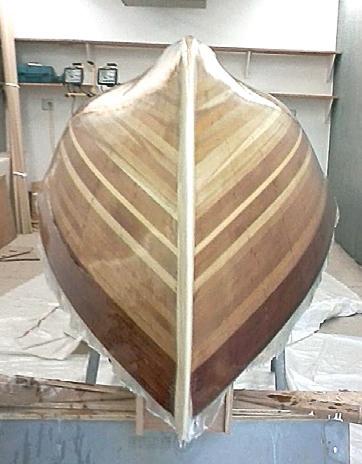
Measuring 15 ½ feet long, 4 feet wide, weighing in about 110 lbs., Western red cedar and Alaskan yellow cedar form the hull. The “football” bottom board is ½ inch solid Cherry. Both stems and partial decking are Aspen. The deck is both Western red cedar and Aspen. Out-wales are Spruce/ In-wales are Ash. Oars are Canadian Sitka Spruce. Seats are Cherry. Asking price: $14,950.00

https://www.youtube.com/watch?v=xn_0FYeANGw

Sincerely,
David J. HuebnerEmail:
shiva1952june@yahoo.com• 641-919-9535

“THE ADIRONDACK GUIDEBOAT”


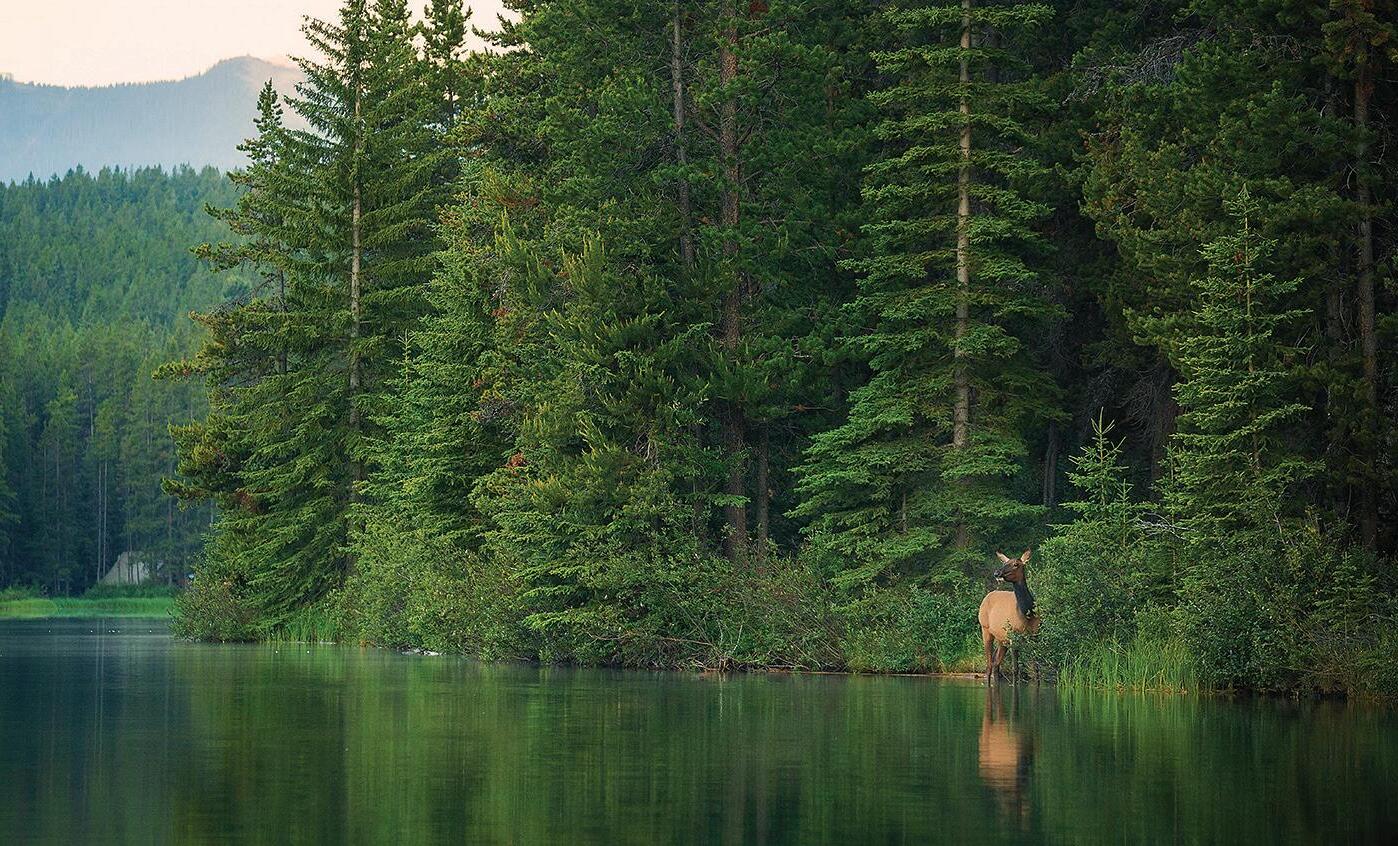

New York State Department of Environmental Conservation Commissioner Basil Seggos announced the 2022 hunting seasons tied 2021 for the safest-ever year, with the lowest number of hunting-related shooting incidents since record-keeping began. DEC Environmental Conservation Police Officers investigated nine hunting-related shooting incidents in 2022, including one fatality.
“It’s clear from these findings that the vast majority of New York hunters follow the State’s stringent safety guidelines and do their part to ensure a safe and enjoyable season,” Commissioner Seggos said. “This record year for safety is a testament to the DEC expert staff, volunteers, and local hunting clubs that work collaboratively to teach safety to hunters of all ages. I commend their efforts and for all hunters who safely and responsibly contributed to our conservation efforts this season.”
Four of the nine HRSIs that occurred in 2022 involved two-party firearm incidents, while the other five were self-inflicted. The one recorded fatality occurred due to a self-inflicted gunshot wound by a turkey hunter. All identified shooters were experienced hunters with an average of 30 years of
hunting experience, emphasizing the need for all hunters to remain vigilant when heading afield. Each incident could have been prevented if those involved followed the proper hunting safety rules.

All first-time hunters, bowhunters, and trappers must successfully complete a hunter, bowhunter, or trapper education safety course before being eligible to purchase a hunting or trapping license or bowhunting privilege in New York State. DEC-trained and certified volunteer instructors have taught hunters and trappers to be safe, responsible, and ethical since 1949. Recently, DEC announced the results of the second year of a
pilot program allowing mentored 12- and 13-year-old hunters to harvest deer with a firearm or crossbow. The results showed youth big game hunters enjoyed another safe, successful, and well-attended season afield. Learn more about DEC’s Hunter Education Program.
DEC encourages hunters to remember the primary rules of hunter safety:
¯Treat every firearm as if it were loaded;
¯Control the muzzle, keep it pointed in a safe direction;
¯Identify your target and what lies beyond;
¯Keep your finger off the trigger until ready to fire; and
¯ Wear hunter orange and pink.
For the past several years, DEC has also tracked and investigated Elevated Hunting Incidents (EHIs), previously referred to as tree stand incidents. EHIs are underreported and DEC is not always notified when falls occur. In 2022, DEC received reports of 13 EHIs, four of which were fatal. Only two of the 13 hunters involved were wearing a safety harness. Tree-stand safety is integrated into DEC’s hunter education course because those incidents have become a major cause of hunting-related injuries. The proper use of tree-stands and tree-stand safety equipment will help prevent injuries and fatalities. Used correctly, a full body harness and a lifeline keep hunters connected from the time they leave the ground to the moment they get back down.
Most tree-stand incidents are preventable when hunters follow the “ABCs” of tree stand safety: ¯Always inspect the tree stand before every use;
¯Buckle full body harness securely every time; and
¯Connect to the tree before your feet leave the ground.
For more information, visit the Department of Environmental Conservation website.

Since the days are longer and the weather warmer, I’ve been able to get back into one of my favorite hobbies: taking my kids for a walk before bed. We live on a quiet country road in the northern Adirondacks, and only infrequently see cars on our walks. But we often get to see lots of birds, rabbits, deer, and squirrels. But the other night, the kids and I had one of, if not the, most unique wildlife experiences of our lives.
About a quarter-mile from my house, a small stream crosses the road. There are drainage ditches that lead up to the stream, and my kids — Hudson, 4, and Elodie, 2 - LOVE to go to the “waterfall,” which is actually where a drainage ditch drains from under someone else’s driveway. From there, the stream is only about 20 feet away.
We made our regular walk to
the waterfall and headed to the stream. Hudson began asking why there was so much more water in the stream than at the waterfall. I explained that the small wetland across the street held a lot of water but that the plants and grass hid it. We went over to look at the wetland, and while there wasn’t a lot of water to see, we did notice two large clumps of what looked like fresh barred owl feathers. I looked around and didn’t see a carcass, but the feathers looked out of place.
The kids and I turned around and went back to the stroller, which was parked near the guardrail above the stream. As we walked the 15 feet across the street, I noticed some movement near the stroller and saw that it was a ruffed grouse. I was surprised that it was so close to us, but as we took a couple more steps, the grouse jumped over the guardrail and into the brush.
We watched it for a minute, and I thought, “That was cool,” but then I turned my back to put
the kids back in the stroller so we could go home. I put the kids in, and when I turned back around, the grouse was standing just on the other side of the guardrail looking at us. We started to laugh, and it hopped up on the rail and then into the sand only about a foot from the stroller. The kids and I were kind of shocked, but the grouse was definitely interested in us, and since this was a pretty unique experience, I let the kids enjoy a few moments with this wild animal.
We then began walking home, and in short order, I felt a nip at my heel. I turned around, and the grouse was following us up the road. I thought it was funny and turned the stroller around so that we were walking backward with the kids facing the grouse. It kept following us - first for 100 feet, then 100 yards.
Our road is very quiet, so I could hear the car coming for a while. I pushed the stroller off the road
and hoped like hell that the grouse wouldn’t get hit by the car in front of my very young and impressionable kids. To my surprise, the grouse followed the stroller off to the side of the road, and as I stood there laughing, I looked at the driver, who could clearly see the kids and the grouse, and she had a huge smile on her face.
We started walking up the road, and again, the grouse continued to follow us. At this point, the kids were convinced it was now part of our family and was coming home with us. They weren’t entirely wrong.

Two hundred yards from the stream, the grouse was still following us up the road. We reached our yard, where our flock of chickens was getting some last bites of food before heading into the coop for the night. The grouse was still with us, and rather than risk hav-
Continued on page 5
Continued from page 4
ing it literally follow us inside the house, I turned around and walked towards the bird. It hesitantly skittered into the woods, and as soon as it blended in with the trees, Elodie started to cry because she wanted the bird to sleep in her bed. I’m a pretty lenient parent, but having a wild bird in my toddler’s bed was a bridge too far. And I doubt our cats would have been pleased with the situation either. So we walked away, still being able to hear the grouse scratch at the ground but not being able to see it.

It’s rather common for grouse to become territorial around their nests in the spring, but this seems like a pretty unique experience. While I doubt this particular grouse will live in our yard, my kids had an unforgettable interaction that will hopefully stay with them. After all, we live in the Adirondacks specifically because of the opportunities to enjoy nature. Having a once-in-alifetime experience while out on a routine evening walk makes the woods and wildlife of the Adirondack Park all the more magical, for the kids and for me.

The New York State Department of Environmental Conservation issued guidance to help prevent conflicts between people and coyotes. Coyote sightings are likely to increase in the coming months and DEC encourages New Yorkers to be aware of the potential for conflicts and follow DEC guidelines to prevent negative encounters.

Coyotes inhabit a variety of habitats throughout the state, from rural farmland and forests to populated suburban and urban areas. For the most part, coyotes will avoid human contact. However, conflicts with people and pets may occur, particularly during the spring denning and pupping period when coyotes tend to be more territorial and protective of pups. Furthermore, if coyotes learn to associate food, such as garbage or pet food, with people, these animals may lose their natural fear of humans, increasing the potential for close encounters or conflicts.
To reduce or prevent conflicts with coyotes, New Yorkers are encouraged to take the following steps:
¯ Never feed coyotes.
¯ Do not leave food outside. Pet food and garbage attract coyotes
and other wildlife and increase risks to people and pets. DEC encourages people to:
¯ Feed pets indoors.
¯ Prevent access to garbage.
¯ Fence or enclose compost piles.
¯ Eliminate availability of bird seed. Concentrations of birds and rodents that come to feeders can
attract coyotes.

¯ Do not allow coyotes to approach people or pets. If you see a coyote, be aggressive in behavior, stand tall and hold arms up or out to look as large as possible. If a coyote lingers for too long, make loud noises, wave arms and throw sticks and stones.
¯ Teach children to appreciate
coyotes from a distance.
¯ Do not allow pets to run free. Supervise outdoor pets to keep them safe from coyotes and other wildlife, especially at sunset and at night. Small dogs and cats are especially vulnerable.
¯ Fence yards to deter coyotes. The fence should be tight to the ground, preferably extending six inches below ground level and taller than four feet.
¯ Remove brush and tall grass from around homes to reduce protective cover for coyotes as they are typically secretive and like areas where they can hide.
¯ Ask neighbors to follow these steps to prevent coyote conflicts.
In spring, coyotes tend to be more active and may be more visible. Just seeing a coyote occasionally is generally not a cause for concern. However, if they exhibit bold behaviors and have little or no fear of people, or if they are seen repeatedly during the daytime near residences, contact your Regional DEC Wildlife Office for assistance. In emergency situations, contact your local police department.
For more information, visit the Department of Environmental Conservation website.



According to AllTrails, Champlain Area Trails’ (CATS) South Boquet Mountain via Wildway Overlook Trail is #9 of the top-rated hikes in the Adirondacks.


First-time or amateur hikers (or families) will enjoy walking the Wildway Overlook Trail to witness the beauty of South Boquet Mountain near Essex, NY. This hike measures 1.8 miles, taking most hikers just over an hour to complete. Wildway Overlook Trail also features lovely wildflower patches, forest

views, and views of Lake Champlain, the Champlain Valley, and the Green Mountains of Vermont across the lake. The trail is open year-round. Many visitors enjoy using the trail for bird watching and snowshoeing, as well as hiking.

This trail is part of the Split Rock Wildway, an ambitious effort to create a wildlife corridor connecting Lake Champlain and the high peaks of New York’s Adirondack Mountains. The goal is habitat connectivity—ensuring wild creatures have room to roam. CATS is a critical partner in this private-public conservation effort. The corridor travels west through farmlands and
lands vulnerable to development. This trail is maintained by CATS and is accessible from Brookfield Road. Visit www. champlainareatrails.com under
“Explore, Trails” to view a digital and downloadable map. If you’re hiking on the weekend during the summer, an early start is recommended to beat any crowds.

As Spring unfolds, folks from around the Northeast, and even from farther-flung locations, will arrive to visit the Adirondacks. Our Adirondack region offers a unique wonderland of recreational activities. There are very relaxed opportunities for sightseeing and dining; more adventurous activities like hiking and spring skiing; and for the very adventurous, climbing and mountaineering.
While climbing involves some risk, it can be relatively risk-free if all the right steps are taken. If you are trying out climbing for the first time, it’s important to be part of an organized class, or to hire one of our many excellent local guides, to get started safely and have the most fun.
In recent years, increasing numbers of people are venturing into the “vertical world,” whether on roadside cliffs and boulders or in the bigger mountains on rock and ice. People are finding out that our Adirondacks offer a wide variety of opportunities for climbing in all these different styles.

As well, climbers are finding their voice. Just like the folks in other sports, climbers have an interest in protecting the wild lands and preserving the oppor-
Continued on page 9
Continued from page 8
tunity to pursue this sport. This is why the climbing community has formed the Adirondack Climbers Coalition. Our Coalition has been in existence for five years (we are relatively young!) and we are the unified voice for everyone who climbs (or wants to try climbing) in the Adirondacks. Our priorities include caring for our local cliffs and working with land managers to preserve and improve access to climbing.
Just like a hiking area, a climbing area needs tender loving care. We enjoy working together as volunteers to improve the areas around the cliffs, protecting soil and vegetation from erosion and other human-caused impacts, and just generally making it nicer to be there. If your climbing travels take you to the Deadwater Cliff or to Spanky’s Wall, you can see
some results of our ongoing work.
We also work to improve the trails leading to the cliffs, and we lobby land managers to improve parking options for climbing areas. We are looking to the future, advocating for a formal management plan as part of recognizing the growth of climbing as a sport.

So, whether you are a longtime climber, or just stepping into climbing for the first time, we hope you will join our Coalition. Membership is free! We have learned that the strength of our voice is based on the number of people we represent. I’ve enjoyed climbing here for decades, and I think the ACC is creating the best opportunity for people to continue enjoying this sport long into the future. Just by joining the ACC, you will have pitched in to help.
For more information and to join the ACC, please visit www. adirondackclimberscoalition.org.

We are committed to public safety and providing a safe recreational experience. Use extreme caution around rivers, lakes, and streams when snowmobiling, ice fishing or hiking.

 By TIM HELMS Long Lake & Raquette Lake Events Coordinator
By TIM HELMS Long Lake & Raquette Lake Events Coordinator
This is the perfect time to explore a new trail or area that you have never experienced before. For this outing I chose the Powerhouse and Cascades trails in the Historic Great Camps Special Management Area, which is part of the Blue Ridge Wilderness located in Raquette Lake.
To access the trailheads head south on Sagamore Road for approximately three miles — the first trailhead will be the Cascades Trail on the left side of the road. The Powerhouse trailhead is another quarter mile on the left just across the bridge over South Inlet. The Cascades Trail has a very visible sign marking in the parking lot. The Powerhouse Trail does not have a sign marking the parking lot, but the lot is very obvious and is just across the bridge and hard to miss.
On this day I opted to ski the Powerhouse Trail first, but it does not make a difference which trail you choose to tackle first. They are both very close in distance and elevation changes.
Leaving the trailhead, there were plenty of blue trail markers denoting the way, and the signage was easy to read. Lucky for me, on the day I chose to ski the trail, it was already broken out. The skiing was relatively fast and straightforward. The trail followed the south and eastern shores of South Inlet.
A little under a quarter mile in, I came to the first of the two powerhouse buildings and the trail made a 90-degree right turn, which was very well marked. Just down the trail, — a few hundred feet —, was the intersection of the Powerhouse and Big Slope trails. The Big Slope Trail is another way to access the Sagamore Lake Trail, which follows the shoreline of Sagamore Lake and is open to the public year-round.
The Trail in this section was a classic Adirondack single track ski trail but was very mellow and smooth compared to similar trails and gradually transitions to more of a truck road-style trail.
Continuing on, the trail made some minor turns that were easy to follow. Skiing down a gradual hill, I missed the second powerhouse building on the way in because it was tucked down a hill.
However, on the way out was a full view, which was definitely
worth the quick stop to check out. My recommendation is to take your skis off on the trail and walk down the short hill to the building to peer inside.
The Powerhouse Trail ends as it turns west to cross South Inlet where a bridge clearly once existed and would connect with the Cascades Trail — if it was still passable. The total distance at this point was almost 1.5 miles on the nose, with approximately 180 feet of elevation gain, and reaches a high point of 1,880 feet just before the second powerhouse building.
The ski back to the car retraced my steps, without missing the powerhouse building this time. It offered a nice view of South Inlet down to my right. I climbed the gradual hill toward the high point of the trail and then descended slightly back to the trailhead.
After finishing the Powerhouse Trail I moved my car to the Cascades trailhead, which was about a quarter mile back toward town on the Sagamore Road. I then got ready for the second leg of the journey.
Leaving the parking lot/trailhead, the trail was relatively flat and began as a truck road style, before transitioning to a more quintessential Adirondack single trail style, and back to truck road again.
The Cascades Trail also follows the same blue trail markers as Powerhouse, which were wellspaced and easy to locate. This trail has less signage then the Powerhouse Trail because there aren’t any offshoot trails and no twists and turns where you could get off trail.
As the trail transitions from truck road to woods, it narrows
and travels through a tight canopy of young spruce and balsam that feels more like a tunnel than a ski trail.
I continued on the trail again changing back to truck road style and the forest turns to more open hardwoods. I then was lucky enough to catch the silent flight of an owl as it left its perch and glided through the treetops.
I gradually descended toward the end of the trail and the other side of South Inlet, looking directly across at the Powerhouse Trail. The distance from the parking lot to here was about 1.3 miles with approximately 160 feet of elevation change — the highest point on the trail was 1,912 feet, which was very close to the beginning and the low point at the end of the trail.
Continued on page 11
Continued from page 11
The skiing on the Cascades Trail is less technical than the Powerhouse Trail and it was a great place for anyone just starting out. It was as close to a beginner terrain as one would find on any ungroomed backcountry trails in the Adirondacks. This is not to say that the Powerhouse Trail is difficult or particularly technical, especially compared to most other designated Department of Environmental Conservation skiing trails, but it was slightly more difficult than the Cascades Trail.
Upon finishing the ski, I had to complete the adventure by stopping at the Raquette Lake Tap Room for lunch. On this day there were around 20 snowmobiles in the parking lot and the bar is busy. Kat was the bartender, and waitress of the day and handled the crowd well. There was no better way to cap off a new adventure than to have a beer and a great meal at one of the most iconic bars in the Adirondacks.
Know before you go: Neither the Cascades or Powerhouse Trails have a registry, so make sure someone knows your itinerary before you go. Also, pack appropriately, wear the right clothing, bring plenty of water and stay on the trail.


SARANAC LAKE — More than 100 people competed in the first-ever Saranac Lake 3P race on Sunday.
The event was a mix of an Alpine and Nordic ski race, snowshoe race, bike race, paddling race and foot race, all combined into one big competition. The three Ps in Saranac Lake 3P stand for “Pole, Pedal, Paddle.”
The event started and ended at Mount Pisgah, the village’s Alpine ski venue, where individuals or relay teams did an uphill climb on snowshoes, followed by a downhill ski. After reaching the bottom of the hill, competitors jumped onto their bikes and rode to Dewey Mountain, the local Nordic venue.

From there, the participants completed two cross-country ski laps before hopping back onto their bikes and riding to Beaver Park, on the Saranac River. There they jumped into a canoe or kayak and paddled downstream to the Saranac Lake Fish and Game Club, where they disembarked and ran to the finish line back at Mount Pisgah.
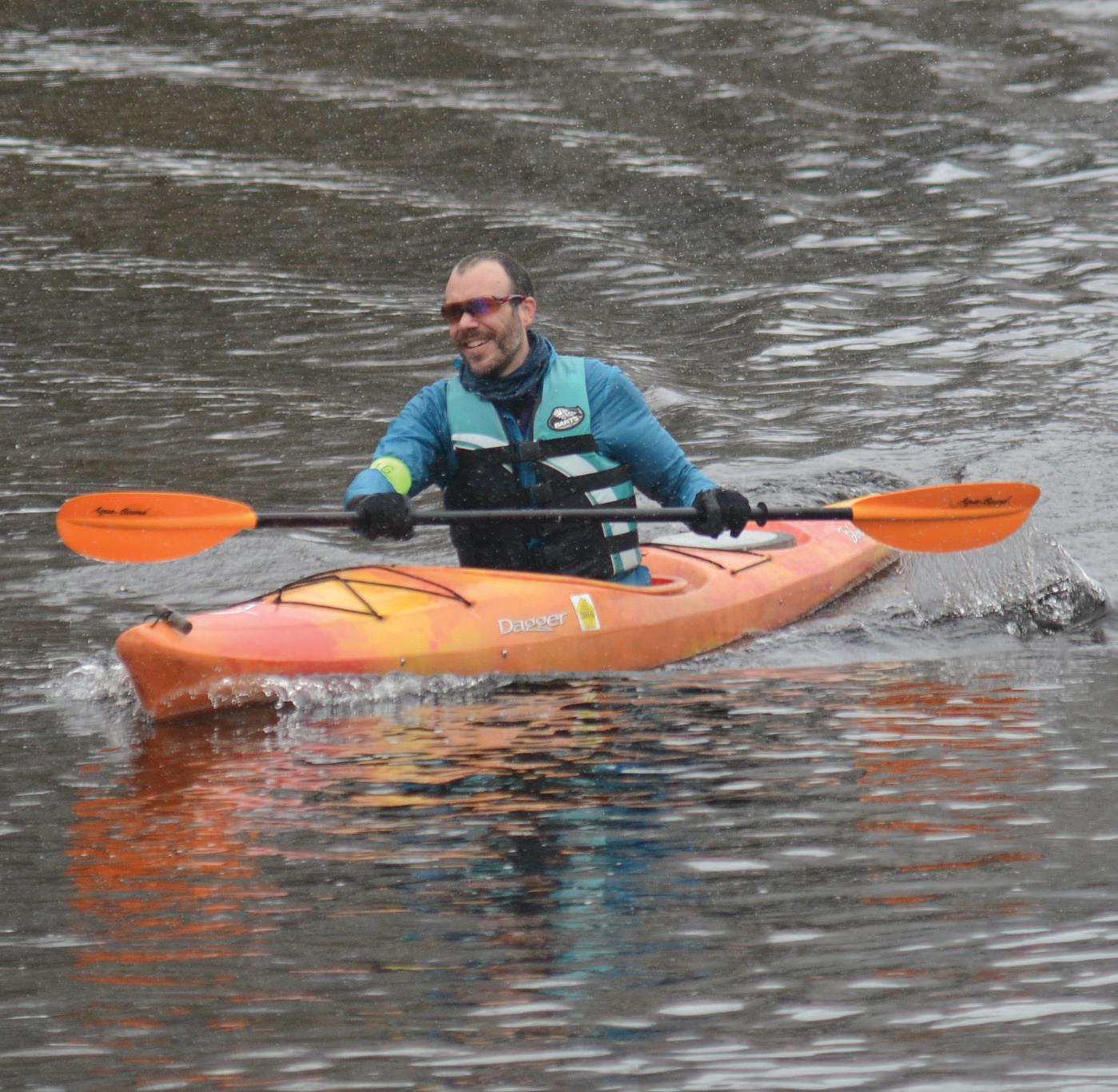
Keith Kogut, the band teacher and Nordic ski coach at Saranac Lake High School, was the first racer to cross the finish line. Kogut edged out a relay team of his varsity Nordic skiers: Jasper Weich, Morgan Martin, Aiden Hesseltine and Jordanna Samburgh.
“I had four of my ski team members behind me, but I think we were all out here for fun,” Kogut said.
Kogut was the first competitor to complete the downhill skiing portion of the race and held onto the lead until he got to Dewey. On the cross-country ski course, Hesseltine moved ahead of his coach on the first lap.
“The transitions were tough because they got to just tag each other, while we had to change boots and shoes and everything,” Kogut said.
The Saranac Lake student-athletes remained in front of Kogut until he passed them on the paddling portion of the race.
“I had a feeling on the river that I would get them,” he said.
Kogut, who has competed in multiple different races in the area, said it was a fun race to compete in and he really likes how it appeals to the local crowd.
“The lifestyle up here prepares you for this race,” he said. “We run, bike, paddle and ski, so it hits all of the targets.”
Nina Armstrong of Lake Placid was the top women’s competitor, finishing in third place overall. She said the race was well organized and she was glad she competed.
“All of the courses were wellmarked,” Armstrong said. “The volunteers and race organizers were all so enthusiastic and just having a great time, which made us have a great time. All of the transitions went so smoothly. It was a great day.”
Armstrong, who competed in Nordic skiing at Harvard University and at Lake Placid High School, made up most of her ground at Dewey on the cross-country course. She said that she was a little bit scared during the paddling portion of the race.
“But they had three people in the water to help us through it, so that was very helpful and a confidence booster,” she said. “I’m not really a paddler, so I was just trying to get down that section.”
The 3P was originally scheduled to take place on Saturday, but
due to the weather, the race was postponed until Sunday. According to race co-organizer Scott McKim, around 18 participants didn’t make it with the schedule change.
“We deferred all of the entries to next year,” he said. “It might’ve been a good thing in hindsight to not have too many people in our first year because there were a lot of question marks because we’ve never done this before.”
Despite a few minor hiccups in its inaugural year, McKim says the event exceeded all of his and the other organizers’ expectations. He added that he hopes this is the first of many years to come for the Saranac Lake 3P.
“We had a race plan, and we kind of executed it,” McKim said. “The village showed up, and it’s been nothing but fun all day. It was a great response from racers. Our small army of volunteers ... it’s been great.”
According to the race organizers, more than 50 people volunteered to help out with the event. McKim said that he had nothing but thanks and gratitude for the volunteers and local and state police for quickly pivoting with the change in date.
“I think what we’ve seen is a community that loves this event,” McKim said. “Our big question (for next year) is, ‘How do we scale up?’ But maybe not too quickly. Like, the biggest limiting factor might be parking, and that’s an amazing problem to have to work through.”
Having spent my life in the outdoors, there is nothing more enjoyable than spending time in nature with others. Mountain Roots Guide Service provides guiding for fishing, ice fishing, hunting and other outdoor activities that you want to enjoy. Let's make memories that will last a lifetime!
Mountain Roots Guide Service LLC- Managing Member: Kelly Starkweather

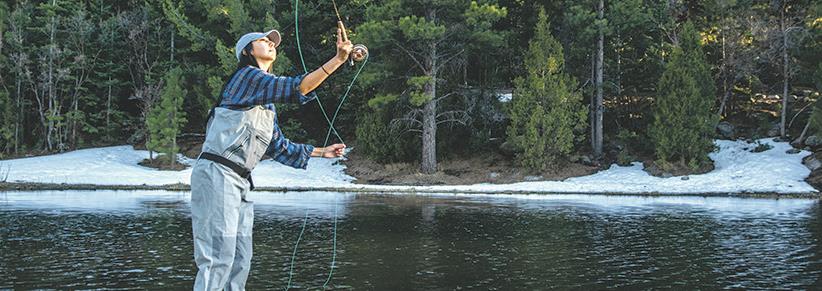
The Hungry Trout Fly Shop

5239 Route 86, Wilmington, NY 12997 518-946-2117
flyfishing@hungrytrout.com
www.hungrytrout.com

www.hungrytrout.com/fly-shop
Over 20 years of professional fly guiding and instruction. Premium fly fishing brands and seasoned, professional fly fishing guides. Lodging, dining, group and multi-day packages available. Voted 2017 “Best Outfitter” in Adirondack Life’s Readers’ Choice Awards.
High Peaks Adventure Cycling
Dirt Camps, Bikepacking, Bicycle Touring, Mountain Biking, Lake Placid to Tupper Lake Rail Trail Tours
Shuttles, Tours, Guides, Lessons, Support Multi Adventure Days with Bike, Hike, Paddle, Overnight Trips, Private, Group, Clubs, Family, Schools
Brian Delaney
High Peaks Cyclery
High Peaks Adirondack Outfitters

Fly Fishing High Peaks Mountain Guides
“True to Our Root” Since 1983
(518) 523-3764
www.highpeakscyclery.com

2733 Main St. Lake Placid, NY 12946






